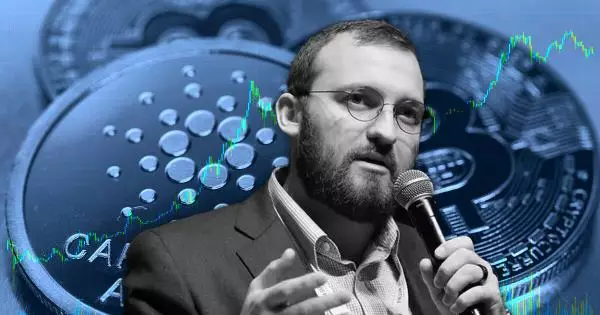Recently, there have been rumors speculating that the US Securities and Exchange Commission (SEC) provided Ethereum with a regulatory free pass. Cardano founder, Charles Hoskinson, shared his thoughts on this matter during an AMA session on X (formerly Twitter). He highlighted how the Himman emails and other revelations shed light on the SEC’s thought process, suggesting that there was an unequal application of regulations. While some critics view this as evidence of corruption, Hoskinson argues that it only showcases favoritism. However, it’s crucial to consider potential biases in Hoskinson’s statement since he was a co-founder of Ethereum but had to leave the team due to differing views on its governance. Nonetheless, this controversy has raised concerns and sparked heated debates within the crypto community.
Highlighting the significance of the Himman emails, Hoskinson attempts to downplay their impact. However, these emails serve as a foundation for potential wrongdoing by the Commission. One particular email revealed that Bill Hinman, an SEC official, engaged with Vitalik Buterin, Ethereum’s co-founder, before delivering a speech wherein he declared that ETH was not a security. This revelation suggests the possibility of Buterin’s influence on Hinman’s stance. Moreover, there have been indications of close ties between Ethereum and the SEC. This creates an inherent conflict of interest, as regulating or dealing fairly with a body so intertwined with external factors becomes increasingly challenging.
Adding fuel to the controversy, Steven Nerayoff, an active participant in Ethereum’s Initial Coin Offering (ICO), continues to claim that the SEC engaged in corrupt practices involving Ethereum. He even asserts that he possesses evidence supporting his accusations. Notably, legal expert John Deaton, who specializes in XRP-related cases, has confirmed Nerayoff’s claims. Deaton claims to have seen the supposed evidence under the attorney-client relationship. The potential implications of Nerayoff’s allegations and Deaton’s support have intensified the scrutiny on the SEC’s actions.
While Charles Hoskinson tries to draw a distinction between favoritism and corruption, many within the crypto community argue that there is no real difference, especially when it involves a government agency. Critics of Hoskinson’s statement perceive it as deflecting responsibility, even going so far as speculating that he might have been involved in the scandal himself. As discussions surrounding the SEC’s actions persist, the line between favoritism and corruption becomes increasingly blurry. The need for transparency and accountability within regulatory bodies like the SEC is paramount to maintain trust and foster healthy growth in the crypto space.
Looking ahead, legal expert John Deaton announced that Bill Himman’s cross-examination would be of “epic proportions.” Deaton even offered to personally handle the cross-examination if the SEC’s case against Ripple were to proceed to trial. This forthcoming event has raised anticipation among those closely monitoring the controversy. It could potentially reveal further insights into the SEC’s decision-making processes and shed more light on the alleged favoritism or corruption surrounding Ethereum.
The controversy surrounding the SEC’s treatment of Ethereum continues to be a matter of intense debate within the crypto community. Cardano founder Charles Hoskinson has shared his perspective, acknowledging the unequal application of regulations but perceiving it as favoritism rather than corruption. However, critics argue that favoritism and corruption are two sides of the same coin, particularly concerning a government agency. The Himman emails, along with allegations made by Steven Nerayoff and supported by legal expert John Deaton, have only deepened the controversy. As the community eagerly awaits Bill Himman’s cross-examination, the potential for further revelations and insights into the SEC’s decision-making looms large. Ultimately, this ongoing controversy underscores the importance of transparency, fairness, and accountability in regulatory agencies to ensure the healthy growth of the crypto industry.


Leave a Reply